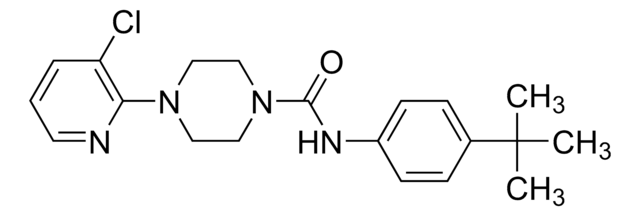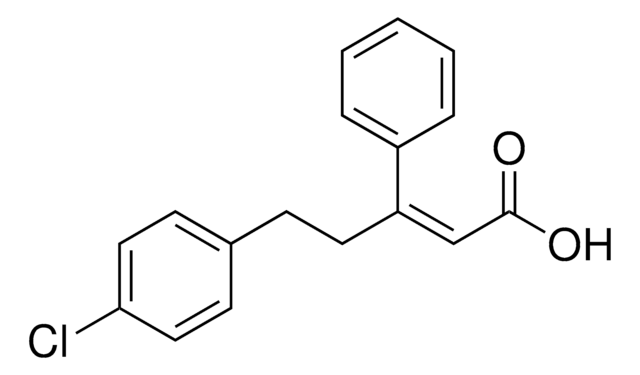SML1600
Rinvanil
≥98% (HPLC)
Synonym(s):
(9Z,12R)-12-Hydroxy-N-[(4-hydroxy-3-methoxyphenyl)methyl]-9-octadecenamide, N-Vanillylricinoleamide
Sign Into View Organizational & Contract Pricing
All Photos(1)
About This Item
Empirical Formula (Hill Notation):
C26H43NO4
CAS Number:
Molecular Weight:
433.62
UNSPSC Code:
12352200
NACRES:
NA.77
Recommended Products
Biochem/physiol Actions
Rinvanil is a Capsaicin analogue that potently activates transient receptor potential vanilloid 1 (TRPV1) channels.
Rinvanil is a Capsaicin analogue that potently activates transient receptor potential vanilloid 1 (TRPV1) channels. Rinvanil induces neuroprotective mild hypothermia in ischemic brain injured mice through TRPV1 activation. Rinvanil exhibits potent anticancer activity in cancer cell lines including cervical (HeLa, CaSKi, ViBo) and leukemia (P388, J774, WEHI-3) cell lines. Rinvanil is not cytotoxic to normal lymphocytes.
TRPV1 (transient receptor potential vanilloid 1) is a capsaicin receptor. It is strongly expressed in sensory neurons and participates in pain perception. In brain, it regulates neuronal function, motor behaviour and neuroinflammation. Capsaicin plays an important role in the activation of TRPV1.
Storage Class Code
10 - Combustible liquids
WGK
WGK 3
Flash Point(F)
Not applicable
Flash Point(C)
Not applicable
Choose from one of the most recent versions:
Certificates of Analysis (COA)
Lot/Batch Number
Don't see the Right Version?
If you require a particular version, you can look up a specific certificate by the Lot or Batch number.
Already Own This Product?
Find documentation for the products that you have recently purchased in the Document Library.
Jin H Nam et al.
Brain : a journal of neurology, 138(Pt 12), 3610-3622 (2015-10-23)
Currently there is no neuroprotective or neurorestorative therapy for Parkinson's disease. Here we report that transient receptor potential vanilloid 1 (TRPV1) on astrocytes mediates endogenous production of ciliary neurotrophic factor (CNTF), which prevents the active degeneration of dopamine neurons and
Katy A Freed et al.
Journal of medical genetics, 48(8), 563-566 (2011-05-07)
Cystinosis is an autosomal recessive disease characterised by the abnormal accumulation of lysosomal cystine. Mutations in the cystinosin gene (CTNS) represent known causes for the disease. The major cystinosis mutation is a 57 kb deletion on human chromosome 17p13 that
Our team of scientists has experience in all areas of research including Life Science, Material Science, Chemical Synthesis, Chromatography, Analytical and many others.
Contact Technical Service








